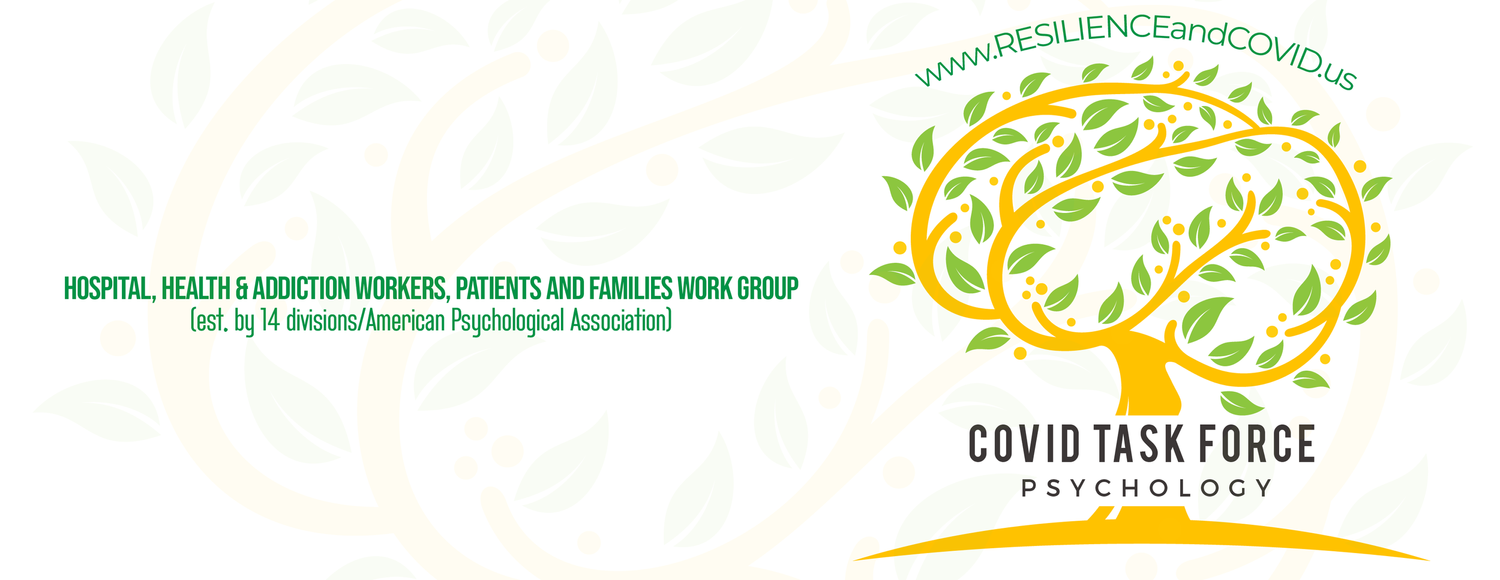Managing Emotional Distress in the Hospital and ICU
Tips for patients, families and healthcare workers during COVID.
This is the third of a series of articles on ICU trauma and how to cope.
Read part 1 here. The Psychological Trauma of Having a Loved One in the ICU
by Maureen O'Reilly-Landry, Ph.D.
Read part 2 here. Making an Emotional Recovery Together During COVID-19
by Ethan Lester, Ph.D.
Read part 4 here. What Can I Do if My Family Member is in the COVID ICU? by Irina Wen, Ph.D.
As referenced in part 2 of this series on ICU trauma, Making the emotional recovery together during COVID-19, it is possible for patients and families to take proactive steps to help prevent chronic emotional distress during this stressful time of COVID-19.
Skills from Recovering Together can be applied to help manage the intense emotional distress that accompanies the sudden onset and hospitalization from COVID-19 for patients, families, and even healthcare workers.
Below is short list of tips if you or a loved one is struggling with a stressful event (e.g., ICU admission, lasting symptoms) during COVID-19. They can also be used for the medical personnel attending to them.
1. Even if it is hard, try to mindfully stay in the present moment.
It is natural to try and distract and distance yourself from your thoughts and feelings during times of intense stress. This distracting and distancing is called experiential avoidance.
When we try to avoid our feelings in times of significant distress (e.g., during a COVID-19 hospitalization), the feelings we are experiencing can actually become stronger and more challenging to manage in the moment.
However, when we try to stay in the moment mindfully – that is, paying attention with intention to the present moment without judgement – we give ourselves the opportunity to:
A) refocus our attention on what matters to us and
B) tolerate the discomfort in the service of learning something new about ourselves and the experience we are having. When you notice your mind is taking you on a trip towards fear and worry related to COVID-19, you can nonjudgmentally say to yourself or a loved one:
“Right now, I notice I am experiencing worry/fear/anger/sadness/etc. I also notice I am not present to what is happening right now. I will now mindfully choose to engage in the present moment and see if there is something here that can help me get through this difficult time.”
This brings us to the second skill…
2. Once in the present moment, try to use an active coping skill.
Once you have found a way to return to the present moment from your worries, fears, etc., it is important to try and participate with the world around you in a way that best suits you and your loved ones that are going through this stressful situation with you.
For some people, simple breathing exercises like diaphragmatic breathing or a breath counting meditation to help their mind refocus on the situation at hand (e.g., managing challenging medical news, navigating a difficult conversation) can be helpful.
If breathing difficulties due to COVID-19 symptoms or being on a ventilator are a barrier for this exercise, consider other exercises like guided imagery or relaxing audio to help as well.
Others may choose to actively cope by writing down a list of their stressors and prioritize what they can change first (tip 3).
Still others may seek social support or self-care strategies that have helped in the past (tip 4).
Whatever it is, remember that coping skills are meant to help you use that energy spent on worry or stress and use them towards adaptive coping strategies.
3. Try and use a combination of both problem-solving and acceptance strategies when the situation calls for it.
While you or your loved one is in the hospital, there are many situations that are out of your control – one’s past medical history, the circumstances surrounding the illness, visitation policies, etc.
Spending your valuable time and effort to try and change the unchangeable can be tiring, frustrating and produce greater negative mood and stress.
Psychological acceptance is one way to free up resources by not having to fight against the reality of the circumstances.
You don’t need to like or approve of what has happened for acceptance to occur – you simply need to be willing to acknowledge that something has happened and to not try and fight against its existence.
This can then free up resources for you or your loved ones to find workable solutions to problems/challenges in real time. It is the difference between pushing against the waves and learning to surf.
Source: Emiliano Arano/Pexels
4. Try your best to take care of yourself and encourage others to do the same by sticking to the basics: sleep, nutrition/diet, physical activity, pleasurable activities, and social support.
This tip is always easier said than done in times of stress.
Often in high stress states, our basic coping and self-care strategies go out the window because we are in a mindset of survival. We stop eating or eat very poorly, our sleep becomes highly disrupted, we lose our regular physical activity routine, we stop doing enjoyable activities, and we push away or become confrontational with our much-needed support system.
Whether you are the patient, the family member, the friend, or a member of the care team, imagining these domains of self-care as daily buckets can be a simple way of taking inventory of your basic foundations of functioning.
If you get to the end of the day and one or more of these buckets are low, consider taking an active step towards replenishing by making a self-care plan. Recovery is a long-distance relay race, and all members of the team need to be able to pace and take care of themselves.
These are a few skills we taught during our Recovering Together program for patients, family and care team members. This tip sheet can serve as an initial checklist for ways of managing distress during a COVID-19 hospitalization for all parties involved. Preventing chronic depression, anxiety and posttraumatic stress by practicing useful psychosocial skills is possible during these unprecedented times, and we can all work diligently towards a shared emotional recovery from COVID-19.

